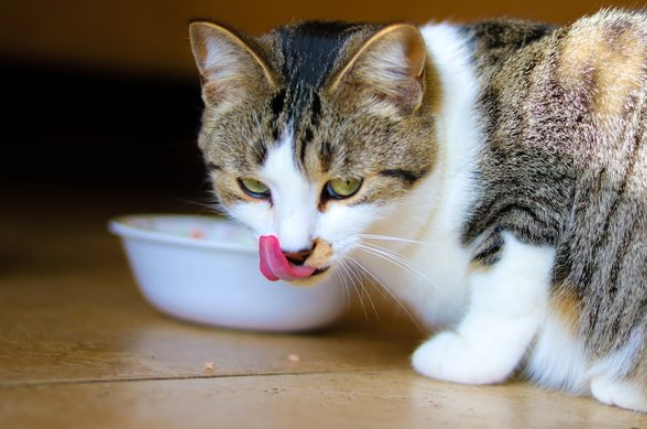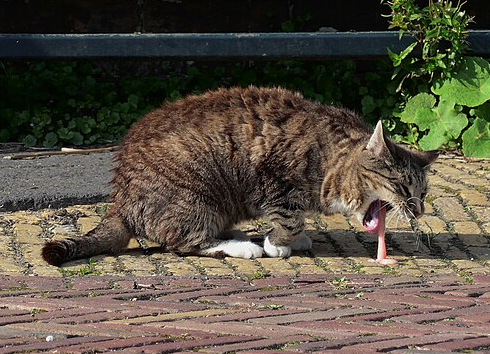Mrs. Whiskers, a ginger fluffball with a penchant for mischief, was perched precariously on the kitchen counter, her emerald eyes fixed on a peculiar red orb. It wasn’t the usual catnip mouse or feathery toy that sparked her curiosity, but lychee, its bumpy skin glistening under the afternoon sun.
This exotic fruit, hailing from verdant orchards in Southeast Asia, had just landed in her human’s fruit bowl, and Mrs. Whiskers couldn’t resist its sweet allure.
But was this juicy treasure a feline friend or foe? Could cats, like her, indulge in the lychee’s delicate flesh without fear of tummy troubles? Buckle up, paw-some pals, because we’re about to unravel the mystery of “Can cats eat lychee?“!
Is Lychee Safe for Cats?
Ah, the million-dollar question! While Mrs. Whiskers’ adventurous spirit is admirable, the answer to “Is lychee safe for cats?” isn’t quite black and white.
Yes, the fleshy part of the lychee is generally safe for cats to eat in small amounts. It’s not toxic and won’t cause immediate harm. However, there are some important caveats to consider before offering lychee to your feline friend.

The Skin and Pit: These are the true villains of the lychee story. The tough skin poses a choking hazard, while the large pit can lodge in your cat’s digestive system, causing major discomfort. Imagine Mrs. Whiskers trying to navigate that bumpy orb through her delicate feline pipes! Not a pretty picture.
Sugar Overload: Lychee packs a sugary punch, and excessive sugar intake can lead to obesity, diabetes, and other health issues for our furry friends. Moderation is key, just like in our own diets.
Individual Sensitivities: Some cats are more sensitive to new foods than others. Introducing lychee, even in small amounts, could trigger digestive upset like vomiting or diarrhea, leaving Mrs. Whiskers feeling less than stellar.
So, can Mrs. Whiskers enjoy a lychee or two? It depends. Remember:
- Always remove the skin and pit first. Safety first, paw-rents!
- Start with a tiny piece, no bigger than a grape. Monitor your feline friend closely for any tummy rumbles.
- Keep it occasional. Lychee should be a rare treat, not a regular part of your cat’s diet.
- Listen to your cat. If they’re not interested or experience any discomfort, ditch the lychee and stick to their usual kitty chow.
Remember, when in doubt, always consult your veterinarian. They can advise on the best treats for your specific cat and help navigate the sometimes tricky world of feline fruitiness. After all, Mrs. Whiskers deserves a happy and healthy life, with or without lychee on her menu!
Potential Risks and Precautions
While the fleshy part of lychees isn’t inherently toxic to cats, there are still some potential risks and precautions to consider before offering them as a treat:

The Skin and Pit:
- Choking Hazard: The tough, leathery skin of lychee is a choking hazard for cats. Imagine a tiny Mrs. Whiskers struggling to swallow a miniature football!
- Digestive Blockage: The large pit in the center of a lychee can also be a serious hazard. It can lodge in your cat’s intestines, causing blockages and requiring veterinary intervention.
Sugar Overload:
- Obesity and Diabetes: Lychees are high in sugar, and excessive sugar intake can lead to obesity, diabetes, and other health problems for cats. It’s like giving Mrs. Whiskers unlimited candy bars – not a good idea!

Image Credit: Deer Park - Dental Issues: High sugar intake can also contribute to dental problems in cats, such as cavities and gum disease.
Individual Sensitivities:
- Digestive Upset: Some cats are more sensitive to new foods than others. Introducing lychee, even in small amounts, could trigger digestive upset like vomiting, diarrhea, or gas. Imagine Mrs. Whiskers feeling like a furry volcano after a lychee binge!

Image Credit: Your Vet Online
Other Considerations:
- Pesticides: Lychees may be treated with pesticides, which can be harmful to cats if ingested in large quantities.
- Allergies: While rare, some cats may be allergic to lychees.
Here are some additional tips for keeping your cat safe if you do decide to give them lychee:
- Always remove the skin and pit first. This is the most important step to avoid choking hazards and digestive blockages.
- Start with a tiny piece, no bigger than a grape. Monitor your cat closely for any adverse reactions.
- Limit lychee to an occasional treat, not a regular part of their diet. A few licks now and then are okay, but don’t go overboard.
- If your cat experiences any vomiting, diarrhea, or other signs of discomfort after eating lychee, discontinue feeding it immediately and consult your veterinarian.
Safe Feeding Guidelines
Prepare the Treat Properly:
- Peel the Lychee: The rough skin is a choking hazard, so carefully remove it before offering any lychee to your kitty.
- Pit the Fruit: The large pit poses a serious risk of intestinal blockage. Take your time and ensure it’s fully removed.
Start Small and Sensibly:
- Tiny Portions: Think “grape-sized” or even smaller for the first taste. Remember, Mrs. Whiskers’ digestive system is much tinier than ours.
- Introduce Gradually: Don’t bombard your cat with a sudden lychee deluge. Monitor their reaction closely after each tiny offering.
Treat Responsibly:
- Occasional Indulgence: Lychee should be a rare treat, like a sprinkle of fairy dust in their regular, balanced feline diet.
- Variety is Key: Explore other cat-safe fruits and veggies to offer a colorful palette of healthy snack options.
Safety First:
- Watch for Warning Signs: If your feline friend experiences any discomfort like vomiting, diarrhea, or loss of appetite after lychee, stop the treat immediately and consult your veterinarian. They’ll know how to best handle the situation and ensure Mrs. Whiskers’ well-being.
Remember: Your cat’s health and happiness are paramount. Treat lychee as a fun, occasional surprise, not a staple of their diet. By following these guidelines and prioritizing your furry friend’s well-being, you can ensure their lychee adventures are full of safe, sweet satisfaction!
Cat-tastic Fruit Alternatives to Lychee

While lychee can be a rare treat in proper moderation, there are plenty of other, even safer, and more perfect fruit options for your feline friend:
Berrylicious Bounty:
- Blueberries: These tiny powerhouses are packed with antioxidants and vitamins, plus their small size makes them easy to portion for your cat. Just imagine Mrs. Whiskers popping a blueberry like a tiny treasure!
- Cranberries: Similar to blueberries, cranberries offer antioxidants and vitamins, but with a tart twist. Be mindful of their higher acidity and start with even smaller portions than blueberries.
- Strawberries: Sweet and juicy, strawberries are a favorite among many cats. Just slice them thinly and remove any leaves or stems before serving.
Melon Mania:
- Cantaloupe: This orange delight is high in water and fiber, making it a refreshing and gut-friendly treat. Cut it into bite-sized cubes and remove the rind first.
- Honeydew melon: Another watery winner, honeydew is gentle on delicate digestive systems and offers a touch of sweetness. Dice it up and share the melon magic with your furry friend.
Bonus Treats:
- Mango: Rich in vitamins and antioxidants, mango can be a delicious occasional treat in tiny, peeled pieces. Be sure it’s fully ripe and avoid the pit.
- Watermelon: Another hydrating and light option, watermelon can be offered in small, seedless chunks. Just monitor your cat for any messy dribbles!
Nutritional Benefits of Lychee for Cats
While the potential risks of lychee for cats outweigh the benefits, mentioning the minimal nutritional value adds a touch of completeness to the article. Here’s a possible section you can consider incorporating:

While lychee is best enjoyed as an occasional treat due to its drawbacks, it’s not entirely devoid of benefits for our feline friends. Here’s a quick look at what it offers, albeit in small quantities:
- Vitamin C Boost: Lychees contain a small amount of vitamin C, an antioxidant that supports immune function. While cats do synthesize their vitamin C, tiny lychee bites can offer a slight supplemental boost.
- Fiber Friend: Lychee contains a bit of fiber, which can aid digestion and promote gut health. However, other cat-safe fruits like blueberries and cantaloupe offer significantly more fiber, making them better digestive allies.
- Hydration Helper: With its high water content, lychee can help keep your cat hydrated, especially on hot days. Just remember, fresh water should always be the primary source of hydration for felines.
Remember, these benefits are minimal and shouldn’t outweigh the importance of moderation and caution with lychee. It’s always best to prioritize cat-safe alternatives like blueberries, cantaloupe, and strawberries for their superior nutritional profiles and lower risk of adverse reactions.
Conclusion
Lychee’s sweet temptation might call, but for our feline friends, caution is key. While tiny, skinless, and pitless pieces can be an occasional treat, always prioritize vet advice and responsible pet ownership. Remember, Mrs. Whiskers’ well-being reigns supreme!
But let’s not forget the purr-fect joy our furry companions bring. From playful leaps to rumbling lullabies, they enrich our lives in countless ways. So, as we explore the world of cat-safe fruits, let’s relish the love and care we share. Every cautious nibble, every shared melon cube, is a testament to the bond that shines brighter than any lychee!
So go forth, paw-rents, and savor every purr, every meow, every moment of companionship. The tastiest treat for both you and your cat is a healthy, happy, and loving bond that blooms forever!
Resources & References
For further information on cat nutrition and safe foods for your feline friend, consider exploring the following resources:
Additionally, you can check out my related articles for more insights into feline dietary choices:
Recommended Video
If you’re interested in learning more about what cats can and cannot eat, consider watching the following video. This informative video may provide some valuable insights into pet dietary choices.
FAQs – Can Cats Eat Lychee
My cat ate a whole lychee, should I be worried?
If your cat managed to gobble down an entire lychee, it’s best to monitor them closely for any signs of discomfort like vomiting, diarrhea, or lethargy. If they seem fine, observe them for the next 24 hours and contact your veterinarian if any concerns arise. Remember, moderation is always key, and a whole lychee is way too much even for the most daring kitty.
Can I give my cat lychee juice?
Lychee juice is even more concentrated in sugar than the fruit itself, making it a big no-no for cats. Stick to offering tiny pieces of the flesh only after removing the skin and pit.
Are there any other fruits like lychee I should avoid giving my cat?
While lychee can be enjoyed cautiously in tiny amounts, other fruits are off-limits for your feline friend. Grapes, raisins, citrus fruits, and avocados are all toxic to cats, so keep them safely out of reach.
My cat loves trying new things, can I offer them anything besides lychee?
Absolutely! Many cat-safe fruits and vegetables can provide a variety and healthy treats for your furry explorer. Blueberries, cantaloupe, cranberries, honeydew melon, and strawberries are all perfect options. Always remember to consult your veterinarian before introducing any new food to your cat’s diet.
Is there anything else I can do to keep my cat happy and healthy?
Beyond mindful treats, providing your cat with a balanced diet, plenty of fresh water, regular playtime, and a loving environment are the best ingredients for a happy and healthy life. Don’t forget routine vet checkups for optimal feline well-being!









